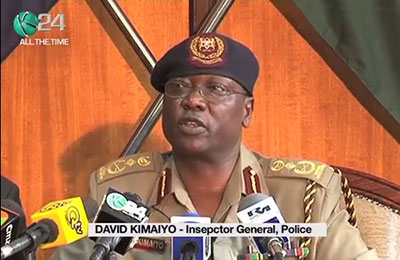On Wednesday, David Kimaiyo, Kenya’s inspector general of police, launched a tirade at the Kenyan press, threatening to arrest and prosecute two journalists for their coverage of the Westgate Mall rescue operation.
Around 1 p.m., Kimaiyo held a press conference accusing the reporters of “provoking propaganda” and inciting Kenyans against authorities in their coverage of the Westgate Mall security operations, according to news reports. The inspector general singled out two investigative reporters, John-Allan Namu and Mohamed Ali, for their story on Westgate aired by KTN Television called “The Inside Story” or “Jechu Pivo” last Friday, Namu told CPJ.
“If you are one of the people in KTN carrying out such offences, we cannot fail to come for you, we will deal with you firmly,” Kimaiyo said at the press conference. Namu was perplexed at the warnings since all media houses covered the Westgate operations. “They seem to think we maligned the military, spinning a narrative against the KDF [Kenya Defense Force], but I cannot see where these accusations are rooted in reality,” Namu said.
Authorities were incensed over reporting that exposed command confusion during the Westgate mall operations, and which revealed at least one police officer was shot and killed by the Kenyan army and CCTV footage appeared to show soldiers looting the shopping mall.
The chief of Kenya’s defense forces, Gen. Julius Karanji, denied the claims, according to news reports, saying the soldiers had merely taken drinking water “to quench their thirst” and opened safes in a “sanitization exercise.” Kenyans on social media also were quick to identify failures in the operation, including conflicting government reports in the wake of the Westgate mall attack, a four-day siege that left at least 67 people dead. Official claims of five attackers killed without any evidence of the bodies, for instance, were highlighted in the press and mocked via Twitter. In reaction, Joseph Ole Lenku, the cabinet secretary for the interior, charged bloggers were “not patriotic enough” during an interview on Citizen TV in late September. The police chief expressed similar sentiments to the press on Wednesday, telling reporters that “we must be loyal to the system and the government of the day,” according to news reports.
Self-censorship took hold of the American press in the wake of the 9/11 terrorist attack to the point where few questioned the lack of evidence to justify invading Iraq. It would appear authorities in Kenya expect similar broad, unquestioning media support for their handling of terrorist attacks here.
Fortunately, the Kenyan press cannot be intimidated. Kenya’s media fraternity protested loudly today with the Kenya Editors’ Guild challenging the inspector general to prove his allegation of incitement and to clarify why his officers were harassing journalists in the course of their duty, news reports said. The privately owned Daily Nation ran the headline “Intimidation” on the front page, while The Standard published a cartoon with a journalist’s lips sealed with a padlock…and a government official walking away with the key. “It’s a sad day for the media in Kenya,” leading private broadcaster Citizen TV said in a strong editorial, “who are witnessing the unacceptable return of the outdated repression of the fundamental freedoms and rights integral to the industry.”
After considerable protest by the media, the police rescinded the threat of arrest late Thursday, according to news reports. But the battle to protect Kenya’s vibrant press continues. The police warning came as Parliament published two media bills that the private Nation Media Group describes as “draconian” for allowing authorities too much control over media operations and content, the Daily Nation reported.
